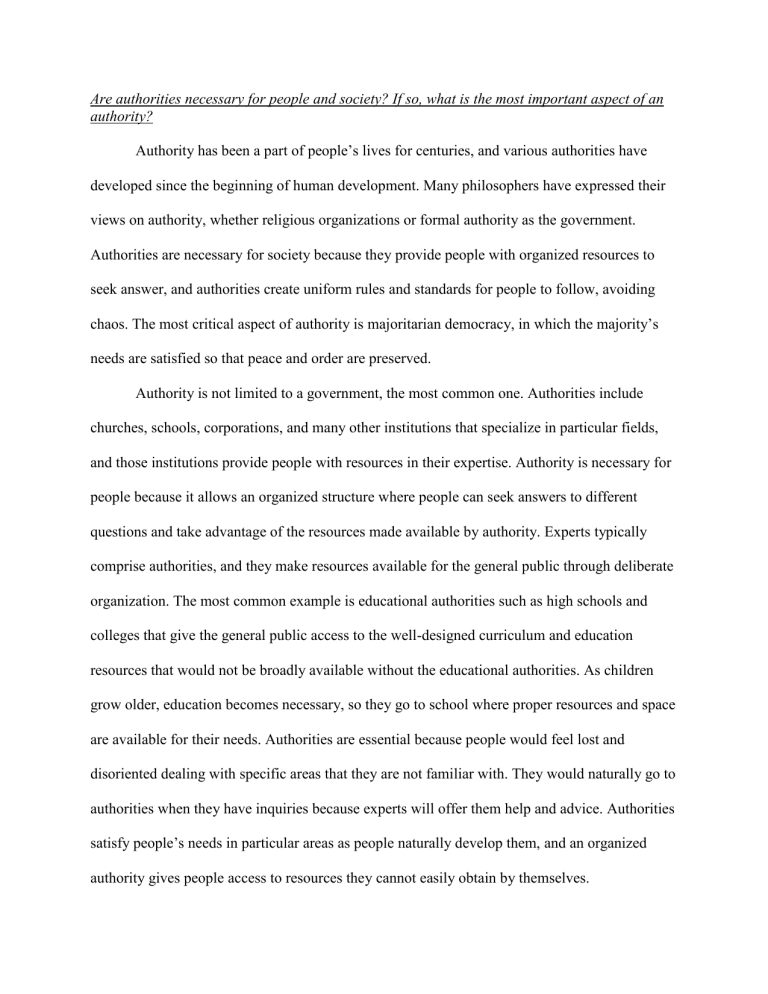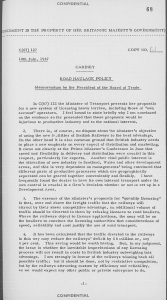
Are authorities necessary for people and society? If so, what is the most important aspect of an authority? Authority has been a part of people’s lives for centuries, and various authorities have developed since the beginning of human development. Many philosophers have expressed their views on authority, whether religious organizations or formal authority as the government. Authorities are necessary for society because they provide people with organized resources to seek answer, and authorities create uniform rules and standards for people to follow, avoiding chaos. The most critical aspect of authority is majoritarian democracy, in which the majority’s needs are satisfied so that peace and order are preserved. Authority is not limited to a government, the most common one. Authorities include churches, schools, corporations, and many other institutions that specialize in particular fields, and those institutions provide people with resources in their expertise. Authority is necessary for people because it allows an organized structure where people can seek answers to different questions and take advantage of the resources made available by authority. Experts typically comprise authorities, and they make resources available for the general public through deliberate organization. The most common example is educational authorities such as high schools and colleges that give the general public access to the well-designed curriculum and education resources that would not be broadly available without the educational authorities. As children grow older, education becomes necessary, so they go to school where proper resources and space are available for their needs. Authorities are essential because people would feel lost and disoriented dealing with specific areas that they are not familiar with. They would naturally go to authorities when they have inquiries because experts will offer them help and advice. Authorities satisfy people’s needs in particular areas as people naturally develop them, and an organized authority gives people access to resources they cannot easily obtain by themselves. Another factor that makes authorities necessary for society is the set of uniform rules and standards that are made possible by them. They are highly useful because when people follow the common rules and standards, the order of society is maintained properly. Rules and standards are almost visible in every single aspect of people’s lives. For example, the value of a currency is regulated by banks and governments so that exchange is possible between different currencies. Without this kind of uniformity, trading and traveling abroad would almost become impossible since there are no common monetary exchange standards. Uniform rules and standards are essential to society because stability and peace are achieved through them. If no traffic rules are regulating the cars and pedestrians, accidents will most likely become an everyday sight. Authorities organize large groups of individuals based on commonality, preserving peace and order in society. Then, authorities’ uniform rules and resources combine to give authorities the most important effect: they prevent society’s chaos from happening. Authorities are highly effective at preventing chaos. The absence of authorities will leave people disoriented because they have no place or resources to seek answers. The lack of uniformity and rules will further add to the confusion. As a result, people will develop their theories and ideas based on their unreliable assumptions, and chaos will be a likely result. Suppose there is no CDC and government to provide appropriate safety practices to protect people from COVID-19, people will come up with incorrect and unsafe measures and cause greater harm to others and society, accelerating the spread of disease and causing chaos. The authorities gather their resources and employ uniformity to encourage safety practices and minimize the potential negative consequences. Without the proper guidance from the authorities, biased opinions will very likely cause harm to other individuals, and chaos is predictable. The authorities’ proper guidance and regulation will keep society’s order and avoid chaos, maintaining a state of peace. The most critical aspect of authority is majoritarian democracy, in that the will of the majority is represented, maximizing people’s benefits. This kind of democracy ensures that the demands of the larger population are satisfied, and their satisfaction will further contribute to the peaceful state of the authority and society. Majoritarian democracy allows individuals to voice their opinions. The authority collects their opinions and makes use of their abundant resources and flexible standards to meet the needs of the majority. An authority that employs majoritarian democracy is most successful because the majority can assert their influence on the authority, and when their needs are met, they follow the rules and standards, contributing to the overall order. The most common example is the presidential election in the US, where citizens can influence the election result directly through voting. When the majority of citizens’ demands are met, they will keep conforming to the rules regulating society. Majoritarian democracy and peace work as a positive cycle inside of authority: democracy leads to peace, and peace will further democracy. Some might argue that majority rule is not enough since underrepresented groups will not have their needs satisfied. Indeed, pure democracy in which every single individual’s demand is met is not practical. Still, majoritarian democracy that satisfies most individuals’ needs is the most effective at maintaining society’s peace and order by maximizing the benefits of the most significant number of people. A society where most people are content is naturally more stable and peaceful than a society where divided groups are constantly quarreling for their distinct interests. An effective authority might have to make small sacrifices for the maximum peace and well-being of itself and its individuals. Authorities have been essential throughout history, and they will keep playing a big role in people’s lives and society because of their abundant resources and uniform nature. Most importantly, society will be stable and peaceful if majoritarian democracy is used effectively to satisfy the majority’s demands.



